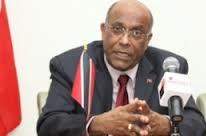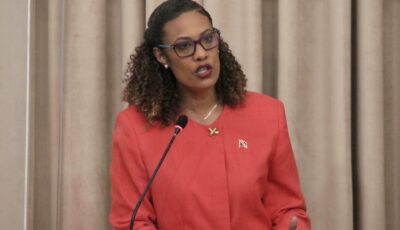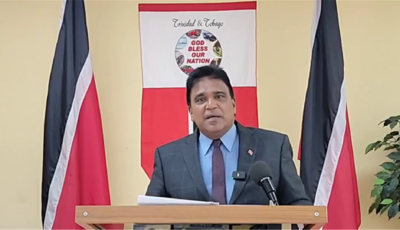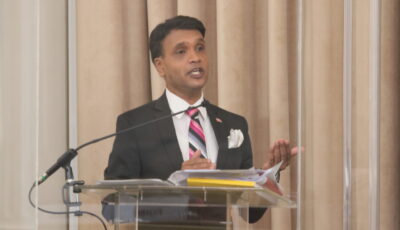Suruj responds to Guardian article “Tide turning against Kamla”

Dr. Surujrattan Rambachan, MP Tabaquite (Deputy Political Leader UNC)
I read with great interest the Guardian’s article on the tenure of leadership of Kamla Persad Bissessar, Political Leader of the UNC, in which it is alluded that her ability to continue as leader is under threat. This is not surprising as positions like these are commonplace after elections where defeated leaders generally come under pressure to resign. In the case of Mrs Bissessar the loss of several elections increases the pressure on her leadership tenure. At the end of the day, she will be in the best position to decide what is in her own interest as well as in the interest of the party and the country.
In my personal opinion, the goal of the UNC at this point in time must be to remain a united force in and out of the Parliament and to demonstrate its effectiveness not only as an opposition but as the alternative government. The electorate has tasted the power of its collective strength to change governments regularly since 1986. It will do again in the future. With the upcoming local elections due by November 2016, the UNC and the Partnership have an opportunity to demonstrate strength and organizational capability and to start the rebuilding of the party. There are 340,000 persons who still have faith in the UNC and in the Partnership.
In these early days following the elections, the disappointment of defeat has turned at times into anger. The anger has been directed at the leader, and this is not surprising. The defeat however must not just to be blamed on the leader. It has to be blamed on everyone. Collective responsibility must be accepted since everyone had an opportunity to tell the leader how they would have felt about the party, her leadership and the campaign.
Having said that, it is noteworthy that the Partnership did get 340,000 votes, and this would have been largely on the perceived leadership competence of Mrs Bissessar. Throughout the five years her job approval rating remained high and surpassed that of the then leader of the Opposition. Had she not had leadership skills which were perceived by the electorate to be credit worthy, these ratings would not have been sustained. At the end of the day, performance and delivery were trumped by other factors expressed in the will of the electorate. However, the vision of Kamla Persad Bissessar for prosperity for all as well as for a kinder and more compassionate governance remained her focus and was demonstrated in several actions which are today visible in the form of programs, policies and institutions.
There can be little argument that she has been the most equitable leader in terms of resource distribution, the visible signs of which characterize the physical landscape of all of Trinidad and Tobago. History and truth will also show that under her administration Tobago benefited more than under any other administration and that her government kept its legal obligations to the Tobago House of Assembly. It remains to see what kind of development will now occur in Tobago.
In discussing the leadership competence and capability of Mrs Bissessar, it is necessary to go back to 2010 and to remind ourselves what we inherited and what financial difficulties had to be overcome. As much as there are persons who don’t wish to hear about it, the need to meet outstanding contractors’ debts, to stabilize the finances of the country in the face of the $20 billion CLICO debacle as well as the $750 million HCU disaster, the need to make payments on VAT refunds as well as to meet the demands of several trade unions in the public sector whose negotiations had been stalled for years had to be urgently addressed. This placed severe strains on the ability of the government to get its programs off the ground in the first two years of office. Despite these challenges, the nation enjoyed prosperity and from a negative GDP the country was returned to growth. Even with the falling oil and gas prices the government was able to quickly adjust its budget and ensure that jobs were protected and that no new taxes were imposed on the people. It would have taken a lot of courage to make these adjustments at a time when the Opposition and others were asking the government to cut several social and educational support programs.
The Moody’s downgrading notwithstanding, there was no loss of investor confidence in the country under her tenure. Investor confidence as much as it is a function of international ratings and economic opportunity, is also a function of leadership, of political and financial stability and of confidence in the future of the country. The nation cannot take away from Mrs Bissessar her role in the creation of investor confidence. The figures are there to show that
investments increased every year under her tenure.
From as early as 2010, understanding as she did the need to attract foreign direct investment she hit the road and became the main salesperson for TT at every major investment forum whether it was in the UK or the USA or Canada. Her overseas missions were mandated to become more trade and investment centered and Latin America was declared to be the new frontier. She used her position as Chair in Office of the Commonwealth top project TT and to build interest in this country. The major Mitsubishi/Massy investment in La Brea is testimony to her salesperson role. The return of the drilling rigs following policy changes and incentives for deep water drilling is further testimony to her success in turning around the decline in TT and laying the foundation for positive growth in GDP. There are those who will play down these initiatives and achievements but had she not led her administration with such strategic interventions, the outcome for national prosperity would have been different.
Lest we forget, from day one as it were, the trade unions were marching and stakeholders were demanding their pound of the flesh from the administration. People tend to have short memories, but trade unions which were offered 0/0/1 percent under the PNM were settled at the beginning at a rate of 5 % and when the Administration ended the general settlement was 14%. There are new agreements to settle and one waits to see what the unions will accept. I am told by those in the industrial relations business that more settlements were achieved in the last five years than in any other equivalent five years of any other administration. But as we saw, all of these great achievements were overshadowed by what the electorate viewed as important.
I recall in the early months following the 2010 elections Mrs Bissessar showed a film to all her Ministers. The film was Invictus and featured the transition to power of Nelson Mandela. It was going to be the philosophy by which her leadership would be characterized. She was prepared to overlook political leanings and work with people though they opposed her even openly. In the choice of a President, she looked for the most acceptable person and not a party sympathiser. The nation applauded her choice. In this and in several other ways she demonstrated a level of impartiality that was uncommon for leaders. In the composition of state boards she bent backwards to ensure that the boards were reflective of the nation’s diversity and would chide Ministers when they brought forward slates which were not so comprised.
She placed emphasis on the development of the nation’s human resources. Today, we are witnessing the unfortunate real feelings of significant voices in our country in terms of their attitudes towards the Debe campus of UWI. This in stark contrast to Mrs Bissessar’s approach which was to place tertiary educational facilities in all the rural communities be it Sangre Grande, Penal, Tobago or Chaguanas. The decentralization of education closer to communities opened up the opportunities for more persons to get a tertiary education. The innovative approaches of TEST under Fazal Karim in terms of NESC Centers as well as work assessment centers is testimony to people centered development and moving persons away from poverty.
The construction of early childhood centers by DR Tim Gopeesingh and the achievement of Universal status for early childhood education is a great honour to this nation and its vision for ensuring that our children below the age of six get the proper foundation of both values and education. All of this is testimony to a leader who had both vision and action to make it happen.
The much maligned health sector also saw a dramatic shift in terms of construction of the Children’s Hospital, the Teaching Hospital in San Fernando and the start of the Arima and Point Fortin Hospitals, the latter two projects which were mere dreams before her administration took office. Nineteen centers for dialysis treatment on a private public sector partnership arrangement as well as longer hours for 45 health centers were introduced. The Nursing Academy in El Dorado is a major development.
It is easy to deflate the leadership achievements of Mrs Bissessar clouded as we are by recent happenings in the electoral battles. However, we must also be fair to her and to note that she was not defeated by her lack of performance or vision. The nation and particularly the supporters of the UNC must dig deeper into what makes for electoral success and go back to 1991 and the era of the NAR. NAR also faced violent upheavals and this despite its management of a country in difficult financial circumstances.
Mrs Bissessar has always been a democrat and a consensus builder. She has demonstrated her support for freedom of speech, freedom of association and freedom of movement. She took hard decisions when she had to so do, unpopular as they may have been, but even then in consultation with the Cabinet and those who needed to be consulted. I saw all of this over the five years.
The UNC is a democratic organization and everyone will in time have the right to choose a new leader or endorse her leadership. In the meantime let us be fair and just towards her, for she did her job with courage and a determination to ensure the prosperity of all the people as well as the security of the nation.
Dr. Surujrattan Rambachan, MP Tabaquite (Deputy Political Leader UNC)






